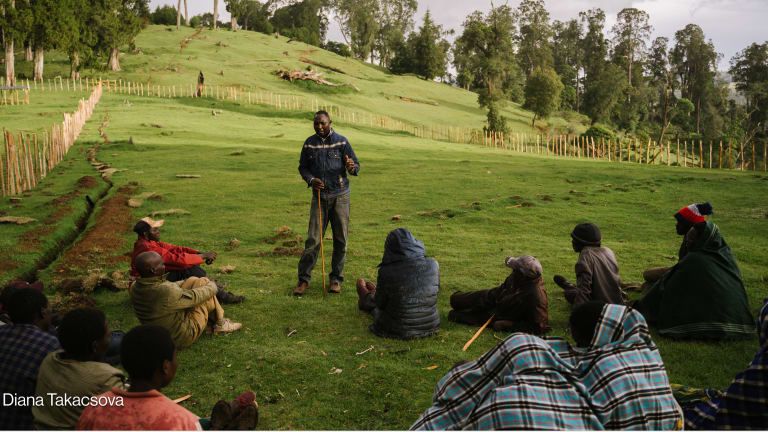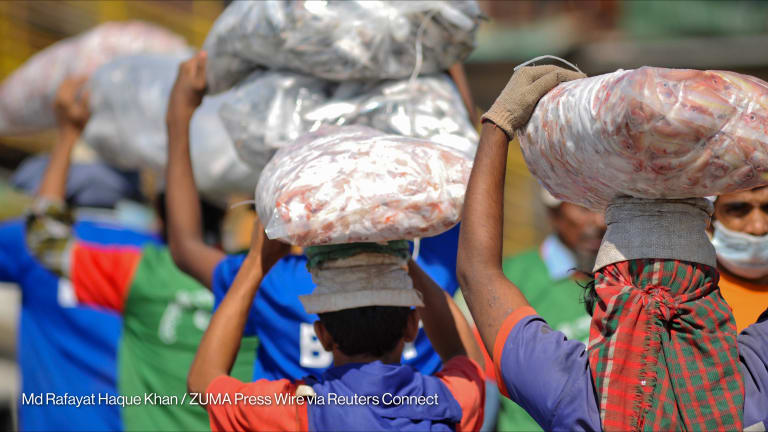Kenyan farmers use water harvesting to counter climate change effects

Armed with rainwater harvesting technologies, farmers in southeastern Kenya are bouncing back with fruit orchards after years of declining crop harvests due to erratic weather.
Working with development organizations such as the Alliance for a Green Revolution in Africa and World Agroforestry, farmers are tapping stormwater runoff from roads flanking their plots and then directing it into basins and ponds that they have created.
From these storage methods, they are able to have a year-round supply of water, even as climate change continues to trigger prolonged droughts in Kenya, according to George Mabuka, a program manager at a local social enterprise called the Cereal Growers Association.
“It is an innovation that is locally known as regenerative agriculture. Farmers can use this stored water to nurse their fruit orchards and even the food crops they have grown in between the trees,” Mabuka said.
Kenyan farmers swap eucalyptus for avocados to preserve water sources
Farmers in Bomet county in Kenya's South Rift region have swapped their eucalyptus trees for avocado trees to safeguard their water resources and earn an extra income from the sale of avocados.
The Food and Agriculture Organization estimates that 40% of the world’s population is living in water-scarce regions. In Kenya — which has an annual supply of renewable freshwater below 1,000 cubic meters (35,000 cubic feet) per capita — many farmers live in arid or semiarid regions. Water-stressed farmers typically wait for a rainy season, with two cycles per year for growing food crops such as maize, beans, and sorghum, Mabuka said.
In recent years, Kenya has experienced a drought, leading to food insecurity domestically. But conditions are now improving for a growing number of farmers who have adopted water harvesting and storage technologies.
Justus Kimeu, a farmer in southeastern Kenya, said the innovations help store rainwater instead of allowing it to drain away into rivers that empty as far as the Indian Ocean.
“The rains here are very minimal and sometimes inadequate. But through water harvesting and storage, I am able to have a produce harvest, even if it is not the maximum I expected,” he said.
Kimeu grows citrus fruits alongside pulse crops and maize, among others. He has carved inlets to direct water runoff from the roadside into his garden.
The runoff is stored in basins that he has dug all over the garden. These are filled with mulch that absorbs and stores the water throughout the year. His citrus fruits continue to naturally draw water from these basins for months after the rainy season has passed.

Kimeu is among the thousands of farmers in southeastern Kenya included in a 15-month project funded by the Alliance for a Green Revolution in Africa.
It has supported farmers to transition from staple crop farming to agribusiness, with mango and citrus farms fetching families as much as 100,000 Kenyan shillings ($900) per year — a previously unattainable figure.
Benedict Manyi, another farmer from the region, has a pond with harvested water to grow fast-maturing trees such as Melia volkensii. Between these, he grows a variety of pulses, pumpkin, and sorghum in what he calls his agroforestry project.
“I also serve the water to my thirsty livestock and use it to manage a section of the farm where I have a kitchen garden for my family,” he said.
Manyi, along with thousands of other farmers, is receiving support from World Agroforestry through the Drylands Development Programme, funded by the Netherlands’ Ministry of Foreign Affairs and World Vision Australia.
The effect that water harvesting is having on farmers battling the pressures of climate change has caught the interest of other farmers who are not taking part in such programs.
Bendetta Mumbua, a mango farmer from Makueni — one of the driest regions in southeastern Kenya — said she would also like to invest in water harvesting at her 8-acre farm but has been impeded by the cost. Setting up the required infrastructure costs around $2,500.
“I feel bad when there is a lot of water on the road when it rains only for it to wash away. Then we are left waiting for the next rainy season. I would really like to be supported to have my own water harvesting system,” Mumbua said.
She said she could use the water to increase yields with mango tree projects between seasons. Mumbua added that switching to year-round harvests would also help her battle an invasive fruit fly that has led to significant losses for farmers. The pest attacks during the peak season when mangoes are typically ripening, but off-season harvests could catch them off guard, she said.
Search for articles
Most Read
- 1
- 2
- 3
- 4
- 5






